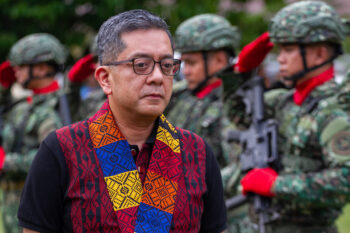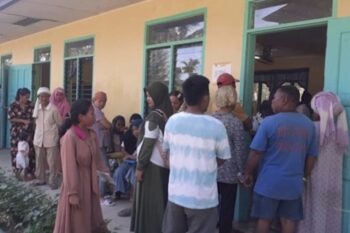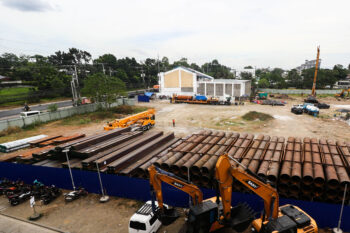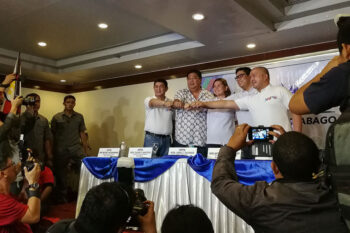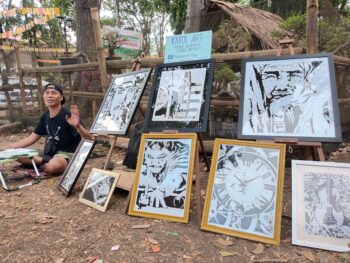(Commencement Speech delivered by Ateneo de Manila School of Government Dean Antonio G. M. La Viña, at the Father Saturnino Urios University in Butuan City on 26 March 2014)
Let me begin by saying how happy I am to be here this afternoon with you, to deliver this commencement address. It is not just an honor but speaking to you on an occasion like this has actually been in my bucket list for quite a while now.
Your university and city has a special place in my heart. I believe that your forests, mountains, rivers and coasts are very important for our island and county. And the diversity of the peoples and communities that are in your region is such a big grace. For these reasons alone, this is a prime forum for me to speak about things I greatly care about.
But more, there are personal reasons too. Years ago, when I was in fourth year high school in Xavier University – this was 1975-76 – we met Urians in a regional choir meet in Cagayan de Oro. At that time, you were part of Region X as Caraga has not yet been created. I became friend with some of those Urians and have always wondered what became of them. This was before cell phones, email, Facebook and other new technologies that assure connections
Later, when I became a human rights and environmental lawyer, my organization, the Legal Rights and Natural Resources Center, worked with many Lumad peoples and communities in the area and I became familiar with your environmental and social justice challenges. In fact, the last time I was here in Butuan City was in 1997 when I was an environmental undersecretary in the Ramos Administration and the cabinet came here for a presidential visit. Even then, illegal logging and irresponsible mining were big issues in this region and President Ramos gave us instructions to focus on finding solutions to those challenges. I have always regretted not being able to do much to solve your environmtental problems.
And so when Fr. Kits Butardo contacted me way back in March 2010 if I could come here to speak on environmental issues, I immediately said yes. I could not refuse Kits of course, as he was my Philosophy of Man student 30 years ago. But we could not work out the schedule until he contacted me again a few months ago if I could deliver this commencement speech.
I also could not refuse Fr. John whom I met in Rome because all our common friends and mentors have told me about the excellent work he is doing here in this university and for the Catholic Church in Mindanao. I know of course that behind Fr. John are his board of trustees, administrators, faculty and staff. A university is a community and you graduates would not be here without all of those that comprise this university.
The one thing great about universities is that, even as the physical structures change with the new buildings coming up from the ground, many things remain the same. Some of the faculty and staff have been here for decades; when you come back for reunions, many of them will still be here. Believe me, in the very fast paced word we live in today, it is very comforting to see that some things never change.
Now to the serious part of my commencement speech, summarized in three words that I hope you graduates and everyone in the audience can bring home and everywhere with you. These words are: world, nation and island. Many of you will go abroad, I am sure of that, and become world workers, certified Overseas Filipino Workers. Others will work in other parts of the Philippines, some perhaps in the big cities of Manila or even Cebu.
But quite a lot will stay in our beloved island, Mindanao, including in this city.
Wherever you go, this is a good time whether you are ready to leave your campus. Andam na ba mo molakaw? Or do you need a semester more?
When I look at you now in your majestic togas, so handsome and so beautiful, so young, I remember how the late Fr. Horacio de la Costa of the Society of Jesus, brother priest of your founder Father Saturnino Urios, started a 1953 commencement speech he delivered in Ateneo de Davao. Let me quote from this great Jesuit:
“When a brand-new plane taxies up to the runway and pauses for a moment before the take-off, one question is uppermost in the minds of everyone on board. Will it fly?
Tonight, you are like a row of brand-new planes ranged at start of a runway. And all of us, your loved ones, your teachers, are asking the same question. Will you fly?
There is no doubt at all, of course, that you will. You will streak down the runway like a streak and glide into the wide blue sky, flashing your silver wings, and we shall all be very proud of you. However, you have probably noticed one thing about take-off. Before a pilot starts his run, he revs up his motors and takes a final check. Gas tanks filled? Engines turning over properly? Oil pressure at the right level? Rudder and wing flaps working? If everything checks – fasten your seat belts, here we go.
The pilot’s check doesn’t tell him whether his aircraft will actually fly or not. But is does tell him that it has everything it should have, nothing that it shouldn’t have. It tells him that it ought to fly. It might not be a bad idea to do something of the sort here. Let’s take a quick check and see whether you have everything that you should.”
To everyone in the audience, we are very proud of these graduates right? They deserve this. Let’s applaud them to show our agreement that they deserve to graduate.
So let’s do a final check, a last exam: Do you know your basics? Do you have writing and speaking skills? Can you do and understand some kind of math, at the very least to understand budgets? Can you make presentations? Do you have the skills for the professions you will be entering –whether as teachers, nurses, accountants, engineers, lawyers, criminologists, natural and social scientists, counselors, business and corporate people, governemnt employees, and information technology workers? Do you know how to innovate, a skill that your university emphasizes?
For those of you who need to take profesional license exams, are you ready for them?
As some of you know, yesterday was not a good day for bar exam takers all over the country. Even with the Supreme Court lowering the passing grade to 73, only 18% of the more than 5,000 examinees made it. Many of my students in Ateneo and La Salle, less but still one to many in UP Law, did not make it.
I mention the results of the bar exams because there is one more item in the final check list before you fly that I must ask: Do you have the character of the Urian? Has this unievrsity prepared you for life, for the world, and that includes being ready to meet, accept, and rise up from failure.
More than the campus, the buildings and the people, the one thing that never changes in a university is its mission. Do you know what this is for Urios?
Your school motto actually summarizes this mission well. In Latin first “Luceat Lux Vestra” In Englsh – Let Your Light Shine.
Let me be bold enough to say that your final test will not be in this campus and will not be taken once only. It is a continuing test, one you will take everyday and bring everywhere. And this is the question you must ask: Have I made the light of Lord shine in my family, my workplace, in the world, in our country, in this great island of ours? Have I allowed myself to be an instrument for His light to shine in the peripheries of world, nation, and island?
By peripheries, I borrow the meaning that Pope Francis gives to it: “The Church is called to come out from itself and to go to the peripheries, not just the geographical but also the existential peripheries: those of the mystery of sin, of suffering, of injustice, of ignorance and lack of religion, those of thought and those of every kind of misery.” My understanding also is that what Pope Francis believes we are called to bring to the peripheries is the central message of God: that is, Mercy.
If you are able to answer this question in the affirmative most, if not all, of the time – if you are able to say I have brought mercy and compassion wherever I go, then you are really an Urian and this university can truly be proud of you.
So if you go out to the world, become an OFW, driven by need, ambition or adventure, these are the questions you must ask? What do I do with my family back home? If I have a husband or wife and/or children, what are my responsibilities to them if I leave them behind? In my new country whether I am there temporarily or permanently, what are my responsibilities to my fellow Filipino OFWs, to my new community and city. Should I still care for what happens in the Philippines, to Butuan City, to this region, to our island?
Some of us think that going abroad is an escape from out problems in the Philippines. Actually, no. I have been an OFW twice – as a volunteer caregiver for one year in Italy when I was twenty years old, right after College, and as an international lawyer for eight years in Washington DC a decade ago. Your family, city, and country will follow you everywhere. There is no escape and like what you are faced with here, you either embrace, confront and overcome the challenges they bring or you deny them to your peril.
And if I may add, if you go abroad, depending on where you are, you will also have to face global issues such as climate change or the religious terrorism practiced by groups like ISIS and Al Qaeda.
To use a favorite word of Pope Francis, there are peripheries everywhere – of issues, of situations, and of people.
You do not have to go far of course to go to the peripheries. In our country, in Mindanao, in your region and city, and yes, in your communities and families, the peripheries beckon.
For our country, let me just mention three big challenges we face as a nation.
First, the fact that poverty and economic inequality continues to be so severe as ever. What makes this even more scandalous is that our economy has been growing so fast these past five years and is now considered one of the fastest growing economies in the world. But the benefits have not trickled down and most of the gains have been monopolized by the top 1 % in our society, quote a number of them now in the list of billionaires identified by Forbes magazine.
Second, the challenges we faced because of our environmental crisis and related to that because of the so many disasters we that visit us. I have been an environmental lawyer for twenty-five years and while we have had some gains, especially in law and jurisprudence, our problems continually grow exponentially. And in these past ten years, all over the country, including here in your city and region, disasters have exacerbated what is already a critical situation.
Third, corruption at many levels continues to abound. You would think that with “tuwid na daan”, with the PDAF scandals and with the DAP controversy, and with so much coverage of alleged corruption, including many cases now being tries, that corruption would lessen and be minimized. You would have think that congress people would have learned their lessons and no longer push their weigh around to get percentages of projects or to influence how they are implemented. You would have though that if we had successfully tuned off the faucet of corruption that the usual suspect group of politicians would no longer by running in 2016. But that unfortunately is not happen. Corruption leaves and those who practice it have become smarter.
And now our island, Mindanao. I hope most of you will stay here. This is where you are needed. And it is a beautiful island. Like my friend Brother Karl Gaspar, every time I come come home to our island from my many trips all over the world and the Philippines, “my heart declares: “mas matahum pa gyud ang Mindanao” (“Mindanao is still really far more beautiful.”).
This beauty is threatened by destruction because of greed. I hope you will do your part to protect it. Wherever you will end up, there are ways you can still get involved.
The biggest issue of course that we face now; the crossroads we are in is that of peace. This is not the time to argue with you about the Bangsamoro Basic Law or about Mamasapano. There’s enough out there for you to understand the issues. But do make the effort to really discern the facts and to have an informed opinion. The stakes are very big for our country and island on this issue. If we make a mistake and an all-out war breaks, I guarantee you it will not remain in the Bangsamoro areas but it will come to our cities and to the capital. If you become OFWs, it will follow you everywhere – in the Middle East certainly, in Muslim dominated countries likewise, and even in Europe and the United States.
If all out war breaks, and it is seen by the Islamic world as a result mainly of Christian prejudice against our Muslim brothers and sisters, believe me, the consequences are unimaginable.
So my question to you, dear graduates, is simple: How will you respond to these national challenges, to this enormous challenge of peace in our island?
These are not abstract issues. Behind the academic facts, cutting through the analysis of causes and impacts, are human beings, people, individuals in these peripheries.
The poor farmer who still does now own his land because agrarian reform failed him. The disaster victim who loses everyone and everything in a single, terrible storm. The bakwit in Maguindanao who once again makes do with relief goods because of broken promises by government and rebel groups to keep the peace.
In front of all these peripheries, will you be a true Urian and let His light shine, the light of mercy and salvation? In your family, will you be a good father, mother, son, daughter, brother and sister. In this island, will you be a peace maker and love your neighbor – Christian, Lumad, and Moro? In this country, will you fight for social justice and economic equity? If you become a government worker, will you consider public office a public trust? In all of these peripheries, what kind of Urian will you be?
I end with a reminder to you that next week is the most important time for us Catholics. As we celebrate Holy Week, and especially the Tridium, when we commemorate and live again the passion, death and resurrection of our Lord Jesus Christ, let’s recall the constitution of the Christian, the Beatitudes, and ask the Lord as Urians for us to be always faithful to his words:
Blessed are the poor in spirit, for theirs is the kingdom of heaven.
Blessed are those who mourn, for they will be comforted.
Blessed are the meek, for they will inherit the earth.
Blessed are those who hunger and thirst after righteousness,
for they will be filled.
Blessed are the merciful, for they shall be shown mercy.
Blessed are the pure in heart, for they will see God.
Blessed are the peacemakers, for they will be called the sons of God.
Blessed are those who are persecuted because of righteousness, for theirs is the kingdom of heaven.
Blessed are you when people insult you, persecute you and falsely say all kinds of evil against you because of me. Rejoice and be glad, because great is your reward in heaven, for in the same way they persecuted the prophets who were before you.

